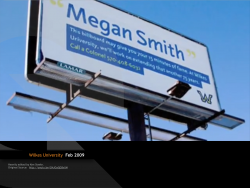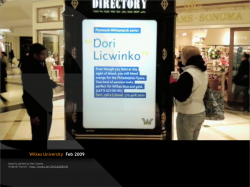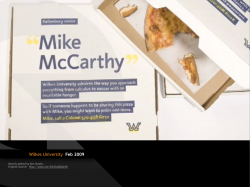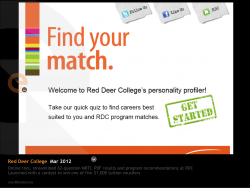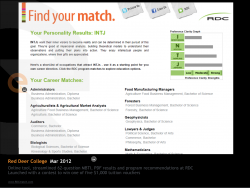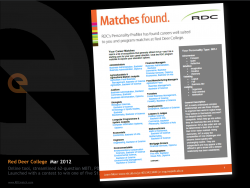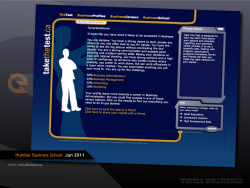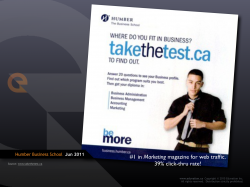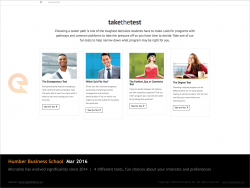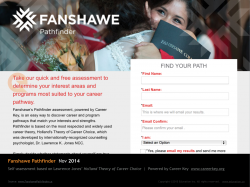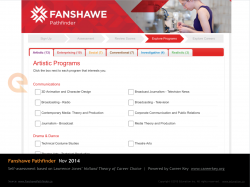Eduvation Blog
Friday, March 25, 2016 | Category: Blog
Are Career Quizzes Effective?
A client recently asked me about online career or personality quizzes as a student recruitment tool.
The difference between wasted and effective communication is sharp insight into your audience. That’s why I co-founded a market research company, specifically to help colleges and universities better understand the various distinct segments of their markets, how they perceive their choices, and make their decisions. But research alone isn’t enough: you need to get answers to the right questions, and then develop a strategy that leverages that insight.
One key insight into prospective PSE students, and particularly traditional-aged ones, is that they are not really fascinated by you, the institution – not by your president’s message (sorry guys), not by your funding announcements or even your shiny new buildings. Prospective students are grappling with fundamental existential questions about themselves – who am I? who do I want to become? where will I fit in? do I want to be like other students there? Yes, very self-centred questions.
So any recruiter, advisor, or marketing effort that approaches the prospective student from that angle – addressing who the student is, helping them find their way, and perhaps even helping them see that your own institution is the perfect fit for them – will capture their attention and build positive connection. Most campaigns that do this focus on student testimonials, or student ambassadors. I think it’s the sort of focus we see most obviously in the sort of campaign Wilkes University ran years ago, with billboards addressed to a single applicant.
- Wilkes University 2009
- Mall advertising
- Pizza box advertising
But the career advisors I’ve met over the years have emphasized to me that properly helping a student make choices of program, credential, or career path usually starts with a Strong Interest Inventory and a Myers-Briggs Type Indicator test, or similar tools. Although some school boards offer students these tools in high school, many do not, and few offer helpful interpretation of the results. It would indeed be wonderful if government, or PSE institutions, could offer an intensive and personal approach to advising to every prospective student, because frankly many are adrift. I’ve seen plenty of research over the years that indicates more career advising is one of the things students would most appreciate.
Since websites are the most-used information source, and often the first point-of-contact, for prospective students, it was perhaps inevitable that colleges and universities would develop streamlined career tools on their sites. The best of these ask a battery of questions that pretty much approximate the insights of the MBTI or Holland Personality Assessment. They provide a series of potential career directions that would be a good fit, allow the student to narrow their choices based on interest, and then link to further information on the various programs offered that can help them on their way.
Over the years, I’ve seen examples that range from transparent sales efforts to unbiased advising. Here are just 3 Canadian examples:
- RDCmatch 2012 site
- MBTI results
- Program Recommendations
One of the first examples I noticed was at Red Deer College in central Alberta, several years ago. They established a microsite, RDCmatch.com, which was shut down sometime between 2016 and 2023. The quiz feels like a streamlined MBTI, and provides results in the same terminology. (Yes, I am an INTJ and proud of it!) It provides some insight into your tendencies, the careers that might best suit you, and then of course links to the RDC programs that could lead in those directions. Naturally, it omits plenty of good-fit programs at other institutions, particularly at universities, but although it takes time to complete the tool, you are left feeling that you were given useful feedback for your effort. (And, of course, RDC captures your contact info.)
- Humber 2011 results
- Humber 2011 ad
- Humber 2016 site
Another great example comes from Humber College, one of the largest in the Toronto region. Humber’s Business School launched a microsite, TakeTheTest.ca, back in 2011 (also taken down by 2023). The test itself was a bit superficial, aiming to tell you what kind of Humber Business student you should be, and I admit the results disappointed me. (Accounting? Me?) But what was really impressive was the promotional effort. In fact, Marketing Magazine recognized Humber’s online ads as the #1 campaign of the year based on their click-through rates, which were a gobsmacking 39%! (Yes, more than a third – not 0.039%, which might be what you would expect.) This result certainly suggests that students are fascinated in learning more about themselves. (Originally the test indicated that it was designed and programmed by Fishbone Inc, although the site has changed substantially since then.)
- Fanshawe 2014 site
- Holland Type results
- Program recommendations
A more recent example comes from Fanshawe College, in London Ontario. The FanshawePathfinder.ca microsite again walks prospective students through a pretty comprehensive quiz, but instead of MBTI results it delivers Holland Personality Type results. Again, it’s a solid payoff for the time invested, and the results seemed pretty credible to me. (I’m Artistic first and foremost, followed by Enterprising.) The site provides useful information about each individual index, and the option to download a PDF report, and of course links to potential career programs at Fanshawe. (The site is powered by Career Key.)
Although in recent years the online career assessment tools have proliferated at a variety of student portals, I still think there is significant value in taking this approach with prospective students. Whether you organize program information on your website based on interest-based clusters (instead of historic faculty/department divisions), build or license a career assessment tool for your website, or actually offer one-on-one advising to prospective students, the focus on them will always pay off.
Post Tags: Advice for Students, Recruitment, Student Success
All contents copyright © 2014 Eduvation Inc. All rights reserved.
